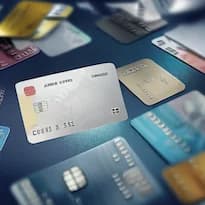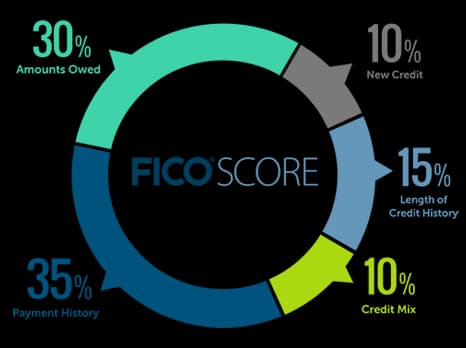From zero credit history to a score of 720+: 9 tips to build a credit score for expats living in the US
I went from zero credit history to a 720+ score in just five months as a new expat—here's my exact playbook including the bank that approved me before I even arrived.
Updated for 2026: This post was originally published in 2022. For the latest strategies and a comprehensive guide, see Building Credit in the US as an Expat: The Complete 2026 Guide.
If you recently relocated to the US like I did, you probably already know this feeling: you have years of financial track record back home, but in the US, you are basically a financial ghost. Your credit score is zero. Nobody knows you. It is a humbling experience, to say the least :P In this post, I will share what worked for me to build my credit score from scratch. I hope it saves you some time and frustration.
I had zero credit history (credit score of zero) and no social security number when I started living in the US, but after about five months, my credit score increased to 720+. In this article, I will also assume that you didn't have social security number (SSN) before, and this is your first time applying/getting a social security number. This is one of the fundamental steps of relocation to the US. If you haven't started applying for a social security number yet, stop reading this and start that process first. It is that important.
If you are unfamiliar with credit scores and their concept, here is a helpful article about FICO score (or feel free to Google some basics). Like me, you likely don't have any payment history after recently relocating to the US.
Here are some tips to help you improve your credit score as an expat in the US:
1. Get a City National Bank credit card as soon as possible
As mentioned in my relocation tips to the US, contact City National Bank before you relocate and sign up for a credit card with them.
City National Bank specializes in working with expats, who are about to relocate to the US, so they won't ask for unnecessary paperwork that they know you don't have.
(Yes it is a real bank, not a fake one. I had that question before :D) Below is the picture of the bank branch in LA.
Amongst the different types of credit cards they offer, my recommendation is a basic one, without the annual fee. Because what you want is not the benefits but a large enough credit limit and a card soon to start building a credit history. Your credit history starts when you activate your card and start charging purchases. For example, they can arrange for your credit cards to be sent to you within the first week after arriving in the US.
A large enough credit limit will help with your credit utilization rate. Without any credit history in the US, typical banks or providers (like American Express, Chase, Capital One, etc...) will only give you a credit limit of less than $5k to start. City National Bank can give you a higher credit limit than that (like $10k or more, depending on your salary).
2. Set up banking relationships with Chase
Knowing that you will likely try to get a credit card with Chase within the first 6-9 months, I recommend setting up a checking or saving account with them (FYI, this is my referral link so when you use it, we are both rewarded). This way, they start to have your information in the system. This can help with your future other credit application with Chase too.
Given the current high-interest rate, I strongly recommend you open a high-yield saving account (HYSA) at other financial institutions too. The interest they offer can be around 4%+. If you don't know about high-yield saving accounts, check out my blog post about HYSA here.
3. Keep the utilization rate low by paying your credit card balance in full sooner than the due date
Since payment history has the biggest impact on credit score and you don't have any credit history, it's crucial to show financial institutions that you're a dependable customer. This means always paying your credit card balance fully and before the due date.
Paying before your statement date helps reduce your credit utilization rate and keeps you from missing a payment and damaging your credit score. To avoid this, set up automatic payments or put reminders in your calendar. More tips about how to keep the utilization rate low are here, under tip #4
4. Sign up for an American Express credit card
The reasons I recommend this are:
- American Express cards are amongst the most sought-after because of the benefits, especially for travel.
- Because of your lack of credit history, it is very unlikely that other banks or financial institutions will give you a credit card within the first few months of arriving in the US.
- City National Bank credit card benefits are not great, so the sooner you can start using another credit card with better benefits, the better it is for you.
This option won't work if you don't already have a personal American Express card in your home country. Amex evaluates if you qualify for a card in the US by using your credit history from your home country.
You can read more about different options here on Amex global card relationship website. You may need to call them on the phone vs. just applying online.
What you need before you can call Amex in the US:
- Social security number: do not call them before you receive your SSN.
- Have your existing/old Amex card from your home country ready so you can give them the card number when asked.
- Other personal documents as they will ask for some forms of ID.
Which Amex card to get depends on your needs. But I assume that since you relocate to the US, you may need to travel back to your country to visit families and friends, so getting an Amex platinum card is good. It has a lot of travel benefits. And the signup bonus is very good too. You can sign up for an American Express Platinum card using my referral link if you want to support me.
Once your Amex credit card is activated, then your Amex credit limit will count toward your total credit limit. So if you pay the balance on time or even before the due date, it will help to keep your utilization rate low.
5. Get a secured credit card if you can't apply for City National Bank and American Express cards
For whatever reason, if you can't leverage the above tactics i.e. getting credit cards from City National Bank and American Express, you may need to start with a secured credit card. It is relatively easy to get one. You can read more about secured credit cards here, including the pros and cons and what else you need to know.
6. Ask your landlord to report your rent payment to the credit bureaus
By saying this, I assume you don't own a property but rent somewhere. Renting helps your payment history become stronger and more consistent when reported to the credit bureaus. Many real estate management companies do this as part of their regular service/contract, so check with yours.
7. Set up auto payment for the utility bills, phone bills, and other regular bills
Auto payment has many benefits for regular bills, including peace of mind. With regards to building your credit score, by using a consistent checking account to pay for bills, you can start using Experian Boost or other similar services after a few months. These services look into your checking account history and identify if you have been paying bills regularly, which then boosts your score accordingly. I started using Experian Boost myself after 4-5 months and saw an immediate increase in my credit score by 10 points.
8. Don't rush into opening too many credit cards
If you're looking to apply for a credit card with a new financial institution, remember that doing so will result in a hard inquiry into your credit history. This will lower your score by a few points temporarily. Additionally, if you don't have much of a credit history in the US yet, there's a high chance you won't be approved for the new card anyway. Lastly, if maximizing the benefits of using credit cards is something you're interested in (like earning sign-up bonuses or points/miles for travel), then do some additional research on which card to get and when before applying.
Now, if you want some quick tips, here they are:
- After getting your Amex platinum card, wait a few months before opening a suitable Chase card like the Chase Sapphire Preferred (My referral link) or Chase Sapphire Reserve. You can select either of these depending on the sign-up bonus at the point of application.
- If you rent, you should get a Bilt credit card. It is the only card right now that allows you to earn points on rent without paying the transaction fee.
- If you're an Amazon shopper, consider signing up for their store card. You can earn different sign-up bonuses depending on Amazon's offer at that time, but the cashback rate is always 5%.
- The 5/24 rule is something to consider when applying for a Chase credit card. The rule entails that your application will be automatically denied if you've gotten more than five new credit cards within 24 months. This is an unofficial rule since there are exceptions. I received an exception myself.
- Before signing up for a new card, look at the sign-up bonuses and see if it is worth it.
9. Sign up for free accounts with all three credit bureaus
I understand your confusion regarding the three credit bureaus in America. To save you time, I recommend:
- Sign up for free accounts with all three of them: Experian, Equifax, and TransUnion
- This will enable you to monitor your credit scores across all three bureaus free of charge.
- You can check your credit scores every other week or every month to see how they change, depending on each credit bureau.
- Don't worry if you see your score jumps up and down (between 15 - 20 points/month) in the first few months. I guess it is normal because of the lack of credit history, so the system needs time to monitor and adjust.
- If you want to explore more, you can also sign up for a free account with credit karma.
- You can see both your TransUnion and Equifax credit scores in one place. And Credit Karma can help to estimate your chance of getting approval for different financial products.
- After signing up with the three credit bureaus, you should freeze your credit reports. Freezing your credit report will not affect your credit score. You will need to freeze your report individually for each credit bureau though so in total 3 times.
- I write more about why every expat should freeze their credit reports here.
10. Additional tips
In the event that you couldn't work with City National Bank or American Express, I wrote down some additional tips to build credit scores here. You will find that some tips are the same.
You can earn more than 4.5% APY without state/local tax today
It is not meant to be exaggerated. The interest rates for US Treasury bills for a 4-week term have been more than 4.5%+ annual percentage yield (APY). You can read more here.
Understand FICO score
Also, for those who want to understand a lot more about the FICO score, here is the expat guide to understanding the FICO score.
Credit card for travel benefits
If you want to know more about which credit cards to get for travel benefits, here is a guide.
Deep dive into credit card for rent
I wrote a deep-dive article about the Bilt credit card here or the Bilt rewards program.
Applying for a Credit Card without Affecting Your Credit Score
If you are wondering whether you can apply for a credit card without impacting your credit score, take a look at this article. I include the pros and cons.
11. Additional FAQs
How long does it take to build credit from zero?
From my experience, it doesn't take long as long as you can follow the steps above. My score was at 680+ level after a few months, and at 720+ after about 5 months.
Do I have a credit score as a foreigner?
As explained above, the answer is No. You don't have a credit score if you are a foreigner who just moved to the US or you only visited the US for short business/leisure trips in the past.
That's all from me for now. Building credit in the US as an expat is definitely a marathon, not a sprint. But from my experience, it is very doable if you are patient and methodical about it.
If you are an expat who has gone through this process, I would love to hear about your experience. Did you find other tips that worked for you? Or if you are just starting out, feel free to reach out with questions :)
Cheers,
Chandler
P.S: I recently created a group on Facebook called Asian Expats in the US so that we can share/discuss more tips directly. Feel free to join.






